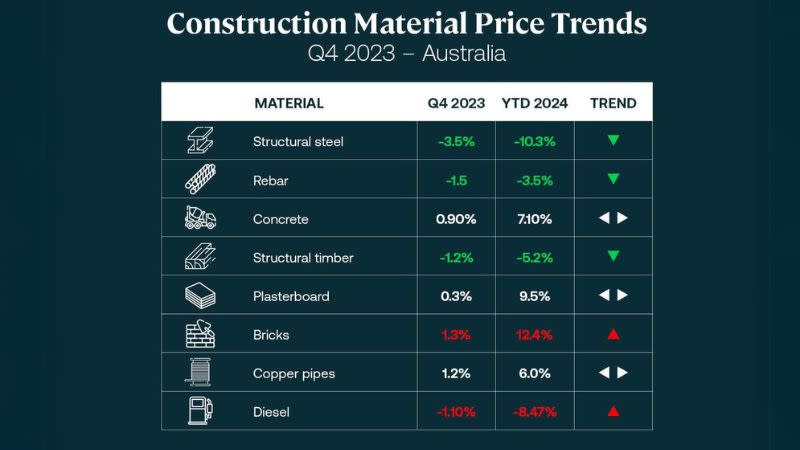
The market may have stabilised, but it will be a tale of mixed fortunes this year for construction with the costs of some key materials forecast to rise.
Altus Group has released its Construction Materials forecast for 2024 and energy-intensive manufactured products are expected to chalk up the biggest escalation this year.
Conflict in the Red Sea is also having an impact on cost and availability of products imported from Europe according to the report, blurring the crystal ball.
“Predicting how 2024 will play out—and what that means for construction costs—is quite challenging,” the report said.
“In the long-term, however, Australia’s challenges are crystal clear: delivering affordable housing and infrastructure for a growing population; tackling climate change while ensuring a just transition to net zero and keeping the lights on; securing a steady pipeline of talent to underpin the nation’s economy and future.
“All of these will require a resilient construction industry able to navigate fluctuating costs and adapt to changing market dynamics.”
Steel prices have continued to decline, and have returned to pre-pandemic levels as demand slowed at the tail end of 2023. Altus Group forecasts price stability for 2024, however the long pipeline of infrastructure projects across Australia will underpin steady steel prices into the medium term.

While concrete prices may have been stable in the final quarter of 2023, they rose 7 per cent year-on-year. Australia’s biggest building materials producer, Boral, is bullish about the year ahead, posting a 9 per cent revenue lift and more than doubling its net profit in the half-year to December. Prices for quarried products rose 3 to 9 per cent from the previous half-year.
Australia’s sluggish residential construction rates have forced down demand and pricing on structural timber. Altus Group is forecasting a dynamic response in price recovery when construction activity returns, particularly in residential markets, as it is an early-stage construction material.
Demand has been sluggish for plasterboard in recent months and consequently the price has remained relatively stable. Altus Group reports a surge in installation costs, particularly in NSW, is driving up the overall cost of the trade.
As a later-stage material bricks have been in demand for the tail end of the home construction cycle. Prices rose during the last quarter of 2023 due to high demand and price increases in energy. Easing of energy prices in 2024 will help reduce the cost of producing bricks.
Altus Group reports there is low demand in the near term for copper, which should keep prices stable. The price of copper bottomed out in 2020 during the pandemic.
Escalating tensions in the Middle East have translated into fluctuating global fuel prices. Diesel prices, in particular, will hinge on the unfolding situation in the region.